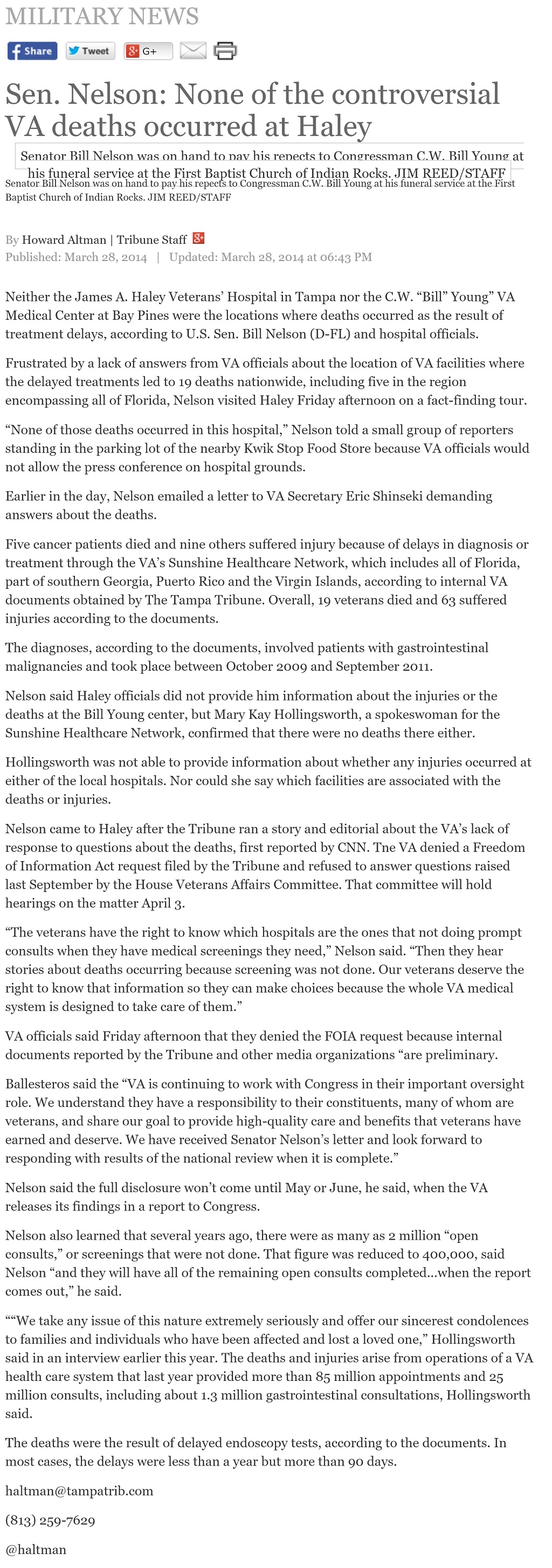
Neither the James A. Haley Veterans’ Hospital in Tampa nor the C.W. “Bill” Young” VA Medical Center at Bay Pines were the locations where deaths occurred as the result of treatment delays, according to U.S. Sen. Bill Nelson (D-FL) and hospital officials.
Frustrated by a lack of answers from VA officials about the location of VA facilities where the delayed treatments led to 19 deaths nationwide, including five in the region encompassing all of Florida, Nelson visited Haley Friday afternoon on a fact-finding tour.
“None of those deaths occurred in this hospital,” Nelson told a small group of reporters standing in the parking lot of the nearby Kwik Stop Food Store because VA officials would not allow the press conference on hospital grounds.
Earlier in the day, Nelson emailed a letter to VA Secretary Eric Shinseki demanding answers about the deaths.
Five cancer patients died and nine others suffered injury because of delays in diagnosis or treatment through the VA’s Sunshine Healthcare Network, which includes all of Florida, part of southern Georgia, Puerto Rico and the Virgin Islands, according to internal VA documents obtained by The Tampa Tribune. Overall, 19 veterans died and 63 suffered injuries according to the documents.
The diagnoses, according to the documents, involved patients with gastrointestinal malignancies and took place between October 2009 and September 2011.
Nelson said Haley officials did not provide him information about the injuries or the deaths at the Bill Young center, but Mary Kay Hollingsworth, a spokeswoman for the Sunshine Healthcare Network, confirmed that there were no deaths there either.
Hollingsworth was not able to provide information about whether any injuries occurred at either of the local hospitals. Nor could she say which facilities are associated with the deaths or injuries.
Nelson came to Haley after the Tribune ran a story and editorial about the VA’s lack of response to questions about the deaths, first reported by CNN. Tne VA denied a Freedom of Information Act request filed by the Tribune and refused to answer questions raised last September by the House Veterans Affairs Committee. That committee will hold hearings on the matter April 3.
“The veterans have the right to know which hospitals are the ones that not doing prompt consults when they have medical screenings they need,” Nelson said. “Then they hear stories about deaths occurring because screening was not done. Our veterans deserve the right to know that information so they can make choices because the whole VA medical system is designed to take care of them.”
VA officials said Friday afternoon that they denied the FOIA request because internal documents reported by the Tribune and other media organizations “are preliminary.
Ballesteros said the “VA is continuing to work with Congress in their important oversight role. We understand they have a responsibility to their constituents, many of whom are veterans, and share our goal to provide high-quality care and benefits that veterans have earned and deserve. We have received Senator Nelson’s letter and look forward to responding with results of the national review when it is complete.”
Nelson said the full disclosure won’t come until May or June, he said, when the VA releases its findings in a report to Congress.
Nelson also learned that several years ago, there were as many as 2 million “open consults,” or screenings that were not done. That figure was reduced to 400,000, said Nelson “and they will have all of the remaining open consults completed…when the report comes out,” he said.
““We take any issue of this nature extremely seriously and offer our sincerest condolences to families and individuals who have been affected and lost a loved one,” Hollingsworth said in an interview earlier this year. The deaths and injuries arise from operations of a VA health care system that last year provided more than 85 million appointments and 25 million consults, including about 1.3 million gastrointestinal consultations, Hollingsworth said.
The deaths were the result of delayed endoscopy tests, according to the documents. In most cases, the delays were less than a year but more than 90 days.
